JLA: Earth 2 (the Deluxe Edition)(2013; originally (c) 2000)
Grant Morrison-Frank Quitely
Doug: I wish there was such a thing as a graphic novel library. Sure, I know some libraries carry a nice selection of such things, but my local public libraries are not very large, and I am pretty certain that if the two local colleges have any such selections it's minimal as well. No, I'm talking about going into one of the super-nice LCS and being able to check out or even rent their wares. I'd have done so with the book we'll be discussing this day. I've had my eye on it since, well -- it's release 15 years ago (and that is mind blowing, etc.). I first encountered the Crime Syndicate as an 8-year old, reading a reprinted tale lurking within the pages of Justice League of America #114 (Nov/Dec 1974), and liked them from the start. Last month I was able to score a copy of the edition I've pictured above on the Black Friday sale at cheapgraphicnovels.com. I paid only $6 for a paperback copy and I'm glad I now own it, but thankful that I didn't pay full price. I really do think it's the sort of book I'd read more than once; the pictures are pretty and the story was thought-provoking. It's not the best Justice League story I've ever read (the Paul Dini-Alex Ross big book might be...), but it was pretty good -- particularly for its publication date.
Doug: I guess DC has gone through 2-3 reboots since this story originally saw the light of day. I'm not really up on all that, but was struck by author Grant Morrison's theories on the then-forbidden fruit of the multiverse. Here Morrison gives a different take on the Marvel concepts of Counter-Earth, or the Earth of the Squadron Supreme, and the DC notion of Earths that vibrate at different frequencies. In Morrison's tale, the Crime Syndicate of Amerika inhabits what they call "Earth", which is part of an anti-matter universe. There everything is wrong -- Benedict Arnold is on currency, there are monuments built to Adolf Hitler, and crime is normal and even upheld. Ultraman rules the planet like a god with the assistance of his partners: Owlman, Superwoman, Power Ring, and Johnny Quick. Each of them uses their powerset to bring havoc to the citizens of the planet. For those scoring at home, these characters used to inhabit Earth-3, with the Justice Society of America hailing from Earth-2 and of course "our" world being Earth-1. Here, the hero of Earth is one Alexander Luthor, complete with that awesome green and purple battlesuit.
Doug: Luthor "escapes" the confinement meted out by Ultraman and makes his way to our Earth, a place that Ultraman will later call "Earth 2". The basics of the plot, without any exhaustive recollection here, is that Luthor has been wanting for quite some time to overthrow the Crime Syndicate. He's come to our planet to enlist the aid of the Justice League. Superman and his six pals are of course skeptical, but this Lex wins them over. After Luthor explains his plans, the JLA meets to decide if they should go through with this jump to the anti-matter Earth. Conveniently, it is decided that J'onn and Aquaman should stay behind on our Earth -- you see how that sets up a one-to-one fight with the Crime Syndicate. But, you'd be wrong, as that never materializes! And I think that's where Grant Morrison scores with this story. There are quite a few things that you might think are going to happen, but then it doesn't come off that way. Conversely, there are some lines of dialogue and/or plot details that give the reader pause.
Doug: Ultimately the JLA is faced with defeat; not at the hands of the Crime Syndicate, but a philosophical resignation to Morrison's posit that good cannot exist against abject evil (the contrary notion also true). And here I found myself putting the book down for a few seconds to ponder that. Although by now almost 15 years old, I wondered if Morrison had any idea how much more negative our world would become and the pessimism that sometimes seems to permeate our feelings, our perceptions. Morrison wrote pre-9/11, pre-War on Terror, pre-Great Recession... but his extreme position of pure good cannot triumph over pure evil (simply put, there's no reference point for an inroad) sure seems a topic for discussion in 2015, almost 2016. This wasn't the sort of book I'd expected when I cracked open the cover.
Doug: Frank Quitely's art is some sort of cross for me between that of Ed McGinnis and later Frank Miller. I draw those comparisons due in large part to McGinnis's affinity for chunky (read: thick) forms and Miller's faces. I find Quitely's art pleasing, and certainly fitting for the story. The coloring, for being "modern" is OK. I think from some of the scans I've provided you can see that it's not muddy, but does have some brightness here and there. Everyone's costumes seem to look "right".
Doug: My edition of the book comes with over 20 pages of goodies, notably Morrison's pitch for the project. What's cool about that is the fact that at some point Quitely doodled the heck out of the script, so there are some really cool thumbnails. There are also character designs.and Quitely's "storyboards" for much of the graphic novel. I always enjoy those "DVD extras" in the back of a trade or hardcover. Nice bonus. So if like the JLA, if you yearn for those multiverse days of yore, then I'd urge you to check this out. And who knows -- you might even be able to borrow a copy.


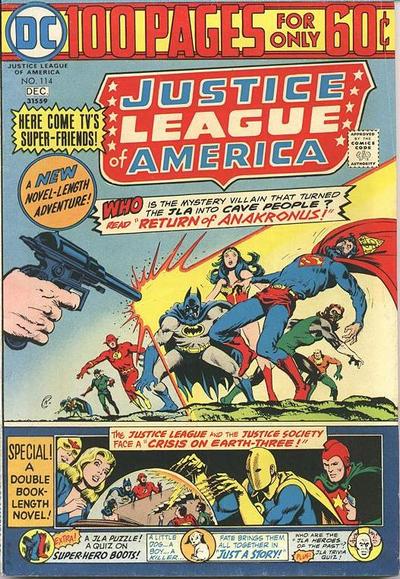







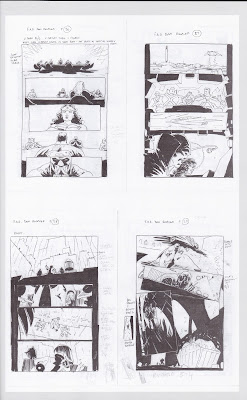






































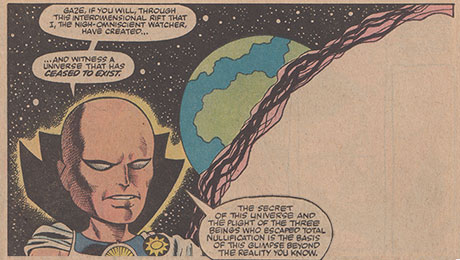





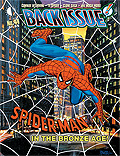
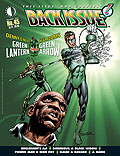


7 comments:
Generally, I'm not the biggest fan of Grant Morrison's stuff, but along with a few other things, this is one of the exceptions. I really enjoyed Earth 2 last time I read it (which was quite some time ago, now that I think of it).
Great review, Doug, and an interesting choice. Your point about Morrison's philosophical musings is in fact the only aspect of the story that I questioned. Basically, it's because I don't think he (or any other DC writer when dealing with this alternate version of Earth, 3 or 2 as the case may be) fully develops the implications of what it would mean for a world, or a universe, in which the concepts of morality and so forth are completely reversed. What I'm trying to say is that here our JLA-ers attempt to liberate the people of the alternate Earth, but as far as I recall, there's never any consideration as to whether the people of that Earth would even want that liberation or see our heroes as, well, heroes. (Just like the people of "our" Earth would hardly welcome the prospect of being taken over by Ultraman and co.) ... Not sure if I'm making sense, since I'm writing this during my late lunch-break and I'm a bit rushed.
All of this tells me that I'm really going to have to go back and re-read this.
Thanks, Edo.
I got the impression, although the scene was fleeting, that the people of Earth-whatever didn't know what to do with themselves when Wonder Woman was making her statement of liberation. I felt that Morrison was using that scene to accentuate his posit that the Earth under which the Crime Syndicate exercised totalitarian control had no reference point for virtue. I felt that "freedom" and its implications fell on deaf ears.
Conversely, in the scene where the CS is wrecking up Washington, DC, I knew that even if J'onn and Aquaman had not arrived to confront the threat, the resolve of humanity would have fought back. So that was Morrison's flipside -- even where good might only have a toehold, evil will never ultimately win.
Which then brings me back to the Earth of the Crime Syndicate. If we assume that those super-villains are not immortal, then we must assume that they were not "always" in control. So what was the condition of that Earth prior? Are we to assume that it was like Apokalips? Or that the people of that Earth were so easily subjugated? Or, that original sin is man's true condition and simply lays latent, waiting to be exploited? But then again, I think we see that the people are not happy with Ultraman's rule.
Pretty heady conversation for a Monday morning! And, we're about to hit the road for a 3-day family visit to Missouri so I'll not be fully capable of being in these conversations for a few days. But know that I'll be watching... like Ultraman.
Doug
"...like" ha! As though we all don't already know that you are indeed Ultraman. :P
Otherwise, not sure how much I'll be able to come back to this conversation myself, at least not today: as usual my Monday is hectic, as I'm now rushing off to my other job...
Looks interesting Doug! I'll keep my eyes open for this one. I liked All-Star Superman by this creative team, and always liked the Crime Syndicate. I don't think I'll ponder too deep about good vs evil this morning, but I'll say I like when these types of opposite characters appear in a story, like in Star Trek with evil bearded Spock. It can seem like a corny idea, but somehow is appealing anyway. I suppose you think about who that character could be if they took a different turn in their lives-- who would I be if a grew up in different circumstances? Fun idea for writers to play with.
Since Doug suggested we need a "Graphic Novel Library", I work in a library and I recommend taking advantage of your library's Interlibrary Loan (ILL) service. I use it to get graphic novels I wouldn't have bought or can't afford (like those hardcover 900-page omnibus books) and some of the reviews I've posted at Bronze Age Reprints have been scanned from books I've gotten through ILL. I've even ordered those Marvel DVD-ROM reprint collections. Which is nice, because they're all out of print and cost hundreds of dollars.
Not exactly what Doug has in mind, but I strongly recommend ILL for graphic novels, Masterworks, or other reprint books. Especially those you're not sure about buying for $50.00 or more.
Hiya,
My problems with stories like this is that I immediately fall into the 'Cracked' syndrome. Not the classic humor magazine but the website dedicated to smug people taking the fun out of everything; as a reference the curious may want to check out their latest article 'Fifteen reasons why Star Wars wouldn't work or Everyone else in the Universe just isn't cool enough to be us.'
I don't really see how this world would survive under the Crime Syndicate. Even if it's only been several years wouldn't the social structures break down? How would urban centers survive? How would we survive the rule of Gods upon Man? Morrison had an interesting idea, but did it explore anything to do with why this world simply didn't collapse under this set up?
Gods Doug, I really wish there was an on-line rental library for comics. The last time I inquired at Marvel it was some sort of limited access deal for a year long contract. I was interested but not that interested so I decided to pass. Did anybody here take them up on it and how did it work?
To J. A. Morris, thanks very much for the ILL suggestion. I use it quite frequently for research purposes, including something that I've pulled together for this site. I just, for some reason, never made the mental leap to include comics related material in this category. Perhaps that's a lingering cultural prejudice on my part.
Seeya,
pfgavigan
I've generally imagined the Crime Syndicate employs a practical kind of tyranny, where if you pay your insurance in full and on time you don't get every bone in your body shattered. I assume all the material wealth has been sucked out of Earth-3, but it's really no fun to be a tyrant unless there are people around to enslave and lord over. Here on Earth-0, most of the wealth is held by a very small group of people (as appears to be true on Earth-3), so it strikes me as a very sustainable proposition.
I admired how Ultraman went out in COIE. Asked what he was going to do as he flew into an obliterating light, he said< "I do what I always do: I fight to the bitter end." In the end, it was a fairly noble sentiment.
Post a Comment